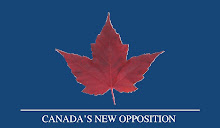Here's a radical idea for senate reform: How about we fill our upper house with a bunch of losers?
I was recently thinking about someone's* objection to list candidates for
MMP, and their suggestion that instead of having a fixed list before the election, the parties sent their best runners-up. So, for example, if the Conservatives won places for 10 list candidates, then you take the ten losing Conservatives with the highest vote totals in their ridings and send them to Ottawa. In terms of MMP I think I like set lists better, but I thought it was an interesting idea, and today it popped into my head that if we wanted to switch to an elected senate this would be a really easy way to do it! After the election simply take the best runners-up in each province and appoint them (for a single election cycle only) to the Senate!
It's surely a terrible idea for all sorts of reasons, but hear me out for a second on a few of its positives:
1) It's not the way the Senate works now.
2) Senators would have a huge motivation to show up for work, in order to try to get into (or back into) the House the next time around.
3) It would somewhat balance the excesses of FPTP (ie. Conservatives in Saskatchewan won 93% of the seats with only 54% of the vote). With our three (four?) national party system this would encourage parties to stay competitive in all regions, rather than abandoning all hope in, say, Alberta.
3a) It would provide a reason for people opposed to candidates in "safe seat" ridings to vote (and also to run!).
4) It would provide a springboard for opposition candidates, helping them to better challenge incumbents. They could gain experience and name recognition while in the Senate, hopefully leading to credible challenges in currently uncompetitive ridings.
5) It would act as a "check and balance" in the case of a lopsided FPTP majority government that didn't have a strong popular mandate. (A majority PM's party would probably usually have fewer than half the seats in such a senate, depending on how the Senate seats are assigned).
6) It wouldn't be any sort of job-for-life, as long as the Senate is smaller than the House. In order to remain in the senate after losing again you'd still need to be remain among the most popular losers in your province.
Just for fun, here's what the senate would look like based on the best losers from the last election and the current rules for number of seats in the Senate per province:
CanadaLiberals: 39 seats
Conservatives: 38 seats
NDP: 17 seats
BQ: 9 seats
Green: 1 seat
Independent: 1 seat
WestLiberals: 9 seats
Conservatives: 7 seats
NDP: 7 seats
Independent: 1 seat
OntarioConservatives: 12 seats
Liberals: 10 seats
NDP: 2 seats
QuebecBQ: 9 seats
Liberals: 8 seats
Conservatives: 7 seats
AtlanticLiberals: 11 seats
Conservatives: 10 seats
NDP: 8 seats
Green: Elizabeth May
I welcome explanations of how this is worse than the status quo in the comments!
* I think it was Calgary Grit, but I can't find the post now.
